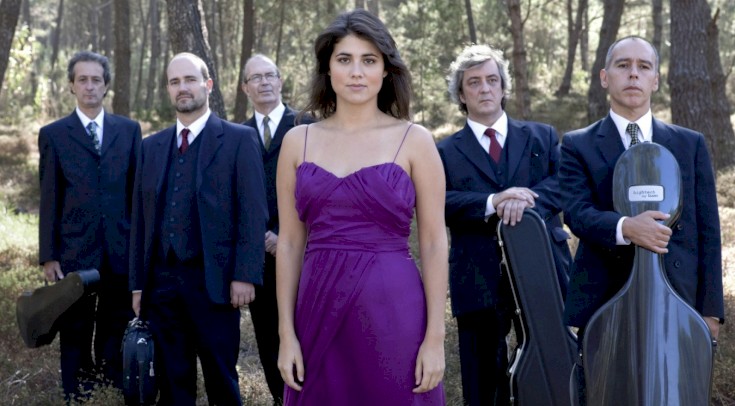Madredeus
Die Zeit

Artist information
Madredeus combines traditional Portuguese music (many times erroneously associated with the subgenre of Fado) with influences of modern folk music. The lyrics are often melancholic and related to the sea or travelling or absence, continuing a tradition of songs that dates back to Medieval times (with obvious relations to cantigas de amigo among others).
The band's founding members were Pedro Ayres Magalhães (classical guitar), Rodrigo Leão (keyboard synthesizer), Francisco Ribeiro (cello), Gabriel Gomes (accordion) and Teresa Salgueiro (vocals). Magalhães and Leão formed the band in 1985, Ribeiro and Gomes joined in 1986. They'd been searching for a female singer, and found Teresa Salgueiro in one of Lisbon's night clubs. Teresa liked their music and agreed to join, so in 1987 Madredeus recorded their first album, Os dias da Madredeus.
The first album was recorded in their rehearsal space, a disused abbey in Lisbon. The recording was especially strenuous due to deafening interruptions every 5 minutes from Lisbon's tram service, which ran directly above. In honour of this unavoidable presence in their every performance, they named themselves after the line's nearby terminus, Madre de Deus (Mother of God), shortened to the vernacular Madredeus.
In 1993, Pedro Ayres Magalhães left the band temporarily and was replaced in live concerts by José Peixoto (classical guitar). Magalhães rejoined the group later, making it a sextet with two guitarists.
They released several albums and became very popular in Portugal, but remained relatively unknown outside the country. This changed in 1994 when Wim Wenders, impressed by their music, asked Madredeus to perform in his movie Lisbon Story - the soundtrack gave the band international fame. Madredeus consequently toured Europe, South America, Africa and Asia.
In 1994 Rodrigo Leão left the band to start a solo career, being replaced by Carlos Maria Trindade (keyboard synthesizer).
In 1997 Francisco Ribeiro and Gabriel Gomes left the band as Madredeus' style started abandoning its fado roots with the release of O Paraíso. At this time Fernando Júdice (Acoustic bass guitar) was invited to join them, to form the current lineup, again a quintet. Madredeus has sold over 3 million albums worldwide.
In 1998 Madredeus contributed "Os Dias São A Noite (Suso Saiz Remix)" to the AIDS benefit compilation album Onda Sonora: Red Hot + Lisbon produced by the Red Hot Organization.
